“Yes, I grew up here,” the man replied, nodding vehemently in response to the question, gesturing towards a far-off, fenced-in settlement in the south Hebron Hills.
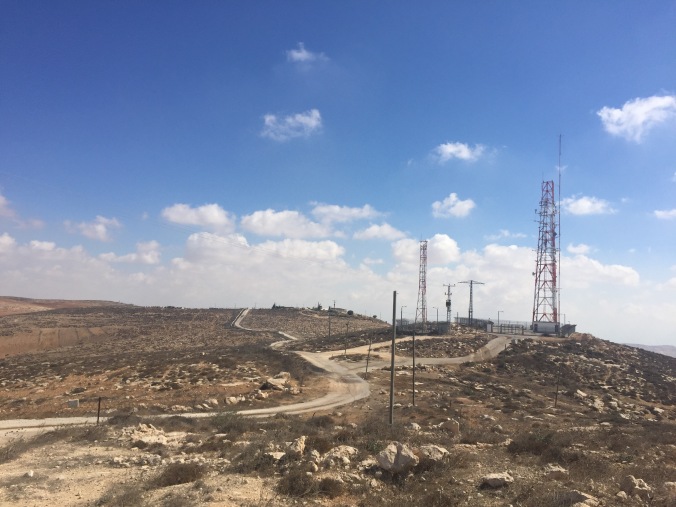
He had been standing with our group, and, until he started to speak, I hadn’t known that he wasn’t a part of it. Our morning had been spent mostly on the bus. This was our first stop, on a hilltop where we could note the invisible green line in one direction and dotted Israeli settlements and Palestinian villages in the other. I knew a few of the group participants but not the majority, so his face didn’t stick out. But this man wasn’t a rabbinical student or one of our Israeli facilitators. This man was a resident of an unauthorized Israeli outpost that could not possibly seem unauthorized to him.
“What he’s been telling you,” he said, referring to our Israeli guide, who had been explaining differing law enforcement practices for Israeli and Palestinian communities. “It’s not true. I’m afraid for my life, afraid to go out. We have to live behind fences to stay safe. They throw stones. I have friends who have died. Stones are not a joke.”
The man’s eyes spoke worry and concern for his future on the land he knew as his own. He was in his mid-20s at least. He had parents and sisters, friends. He grew up there. He knew no other life. How could home be unauthorized?
We thanked him for sharing his story and got back onto the bus.
Down the road in Susya, life was split. On one side, an Israeli settlement, this one authorized, rose up with houses, paved roads, a yeshiva. On the other side, there were tents. Not cute camping tents. The sort of tent that you set up when it’s your only living option, because in return for the army not demolishing your tents, you’ve agreed not to apply for building permits.
A car with yellow plates– an Israeli car– drove up as we were getting off of the bus. Two young men rolled down the windows and called out jovially: “ברוכים הבאים לסוסיא! Welcome to Susya! מה נשמע? How are you?” They drove on to the settlement. We walked towards the tents.
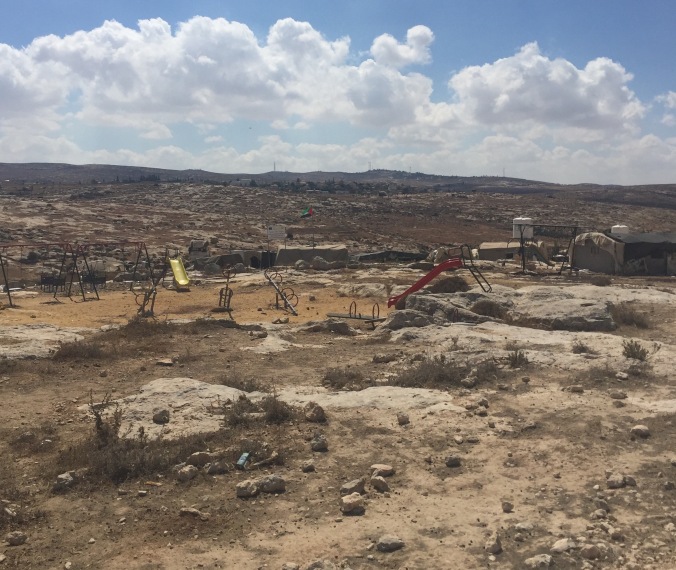
Children were the first to notice. A few small boys and one very small girl came running towards us with calls of “hello.” We walked along the dirt paths and were ushered into a crumbling cement-walled structure with a canvas roof, where a man named Nasser Nawaja (you can read his NYT op-ed from last summer here) told us his story. While he spoke in Hebrew, and our guide translated, the children stuck their heads in through windows and the open door. One particularly rambunctious boy clambered up the side of the building and stuck his head in between the top of the concrete wall and the roof, grinning broadly.
Later that afternoon, as we planted olive trees donated by Tru’ah, that same boy ran around with a pick ax, wanting to dig every hole himself. He was 10 years old– just big enough to be at the top of the kids’ pack without being so big as to be at the bottom of the adult pile. He was at his height of confidence, his handshake close to a high five, his eyes bright with knowledge and void of fear. It was easy to imagine this child one day hefting a stone to defend the land he knew as his own. I feared for him.
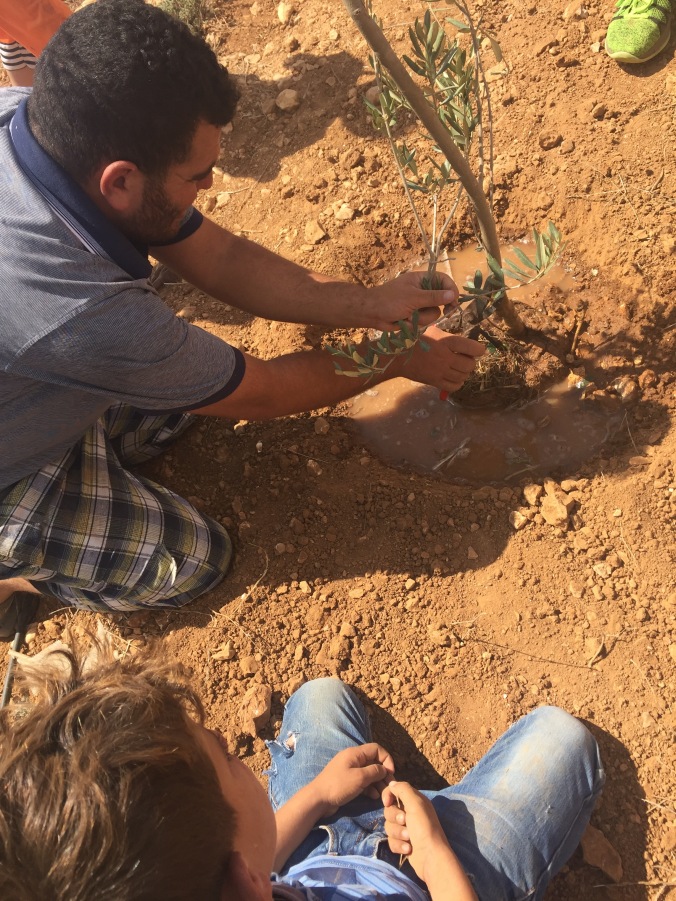
We sat in the sun in hevruta–study pairs–looking at the week’s Torah portion of Ki Tavo (Deuteronomy 26:1-29:8). The Torah is nearly over. After 40 years of wandering the desert, after the turning over of a generation, the Israelites are about to “come to the land that Adonai [their] God has given [them] as an inheritance, that [they] will possess it and settle in it” (Deuteronomy 26:1). The land flowing with milk and honey. The land that the Israelites would come to know as their own. The land that established native peoples, whom the Torah instructs the Israelites to dispossess, knew as their own.
I read the holy words of our holy book and looked out at a 10-year-old Palestinian boy riding a donkey over the dusty ground. I read the holy words of our holy book and looked across the road to homes where Jews were doubtless busying themselves preparing for shabbat.
We got back onto the bus.
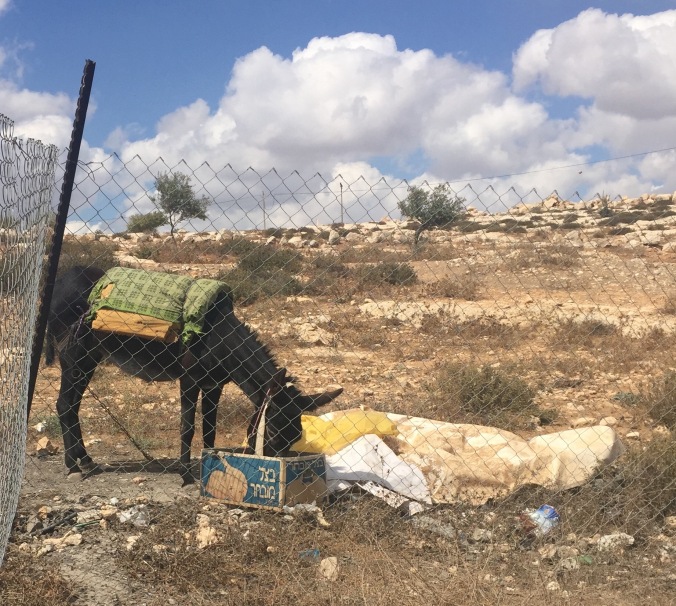
I found a pair for last week’s donkey! Git on the ark, you two!
“I have a question for you,” our guide said as we wound our way back towards the main road. “What can we do to help this conversation in America? Why don’t people talk about it?”
How can people talk about it? I’m afraid to write even this much, even though I’m writing only about what I experienced, even though I’m not assigning blame, even though I’m not saying what I think should or should not happen. Anything regarding this tiny slice of so-sacred land is steeped in emotion and history and, too often, blood. As a future rabbi, a person who wants to be able to serve Jews wherever they might fall on the religious/political spectrum of belief about this place, any form of writing about this land is terrifying. And yet, these stories deserve to be told, and so I will tell them.
We came to a quick stop when army vehicles blocked the road. An Israeli soldier in tactical gear, an M-16 slung across his chest, stepped up to the door of the bus. Our guide’s perfect native Hebrew accent got him answers. There had been a stabbing in a nearby settlement. The assumption was that a Palestinian had stabbed an Israeli settler, but the soldier didn’t tell us that much. He looked too warm in his uniform, tired, ready to do anything other than stand in the middle of this road. Where were we headed, he wanted to know. ירושלים– Jerusalem–our guide told him. He nodded and stepped away. A moment later, other soldiers waved our bus, with its yellow plates, on through the block.
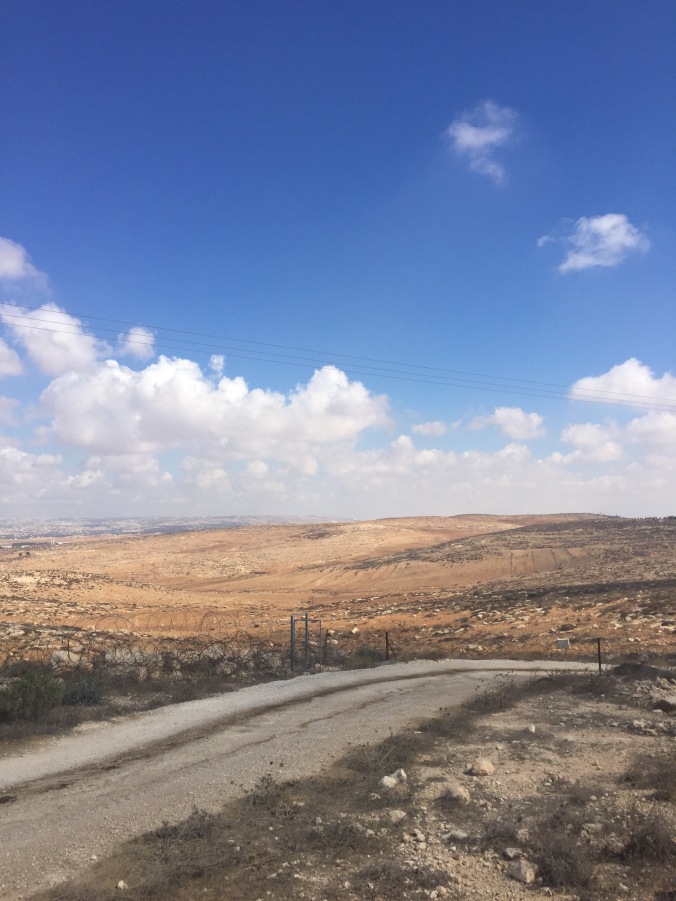
In Jerusalem, I celebrated a vibrant, soulful shabbat service at Nava Tehila and then headed home, overhearing other shuls at prayer and shabbos tables in full swing. There was a magic to it, to the Jewish community in all its variety marking, through open doors and windows, the holiness of the moment. I felt safe as I walked the streets, fearing neither stones nor soldiers. I pray that, soon and in my lifetime, such peacefulness will be possible for all who know this land as their own.
A moving, thoughtful piece — your best so far. Thanks for including the references to the Bible and the oped piece, which I remembered as I was then reading Ari Sharit’s story about the expansion into Arab land and the displacement of traditional settlements. It made me think and ask:
What is the meaning of “land:” To the Arabs, it is their home, the place in the world handed down to them by their ancestors; to the Israelis, it is what was promised to them by God and has about it something sacred that transcends all human values. It is the difference between a religious orientation based on biblical interpretation, and that of a historically situated, secular outlook. Perhaps you and your group could consider how to go about reconciling these opposite perspectives.
LikeLike
Thanks for offering your perspective, grandma! I’m glad you enjoyed the piece, and I think you’re right that the word “land” can mean many different things to different people.
LikeLike
Beautifully written post, Emily–empathetic to both perspectives, telling a story that needs to be told. Thank you.
LikeLike
Thanks Dad 😉
LikeLike